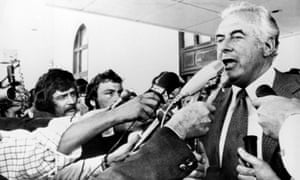Historian Jenny Hocking says letters between monarch and John Kerr are of ‘the greatest historical significance’
Letters between the Queen and a former governor general of
Australia, John Kerr, in the critical period leading up to Gough
Whitlam’s 1975 dismissal will remain secret, after a historian failed in
her bid to force their release.
The letters, held by the National Archives of Australia, were thought to reveal the true extent of the palace’s involvement in what is widely considered one of Australia’s greatest constitutional and political crises.
They included correspondence in the weeks before Kerr dismissed Whitlam, the elected Labor prime minister, and replaced him with Malcolm Fraser, the Liberal opposition leader.
The Monash University historian Jenny Hocking launched a legal battle to force the National Archives to release the correspondence, which she argued was of “the greatest historical significance” to Australia.
The case, resisted by the Turnbull government, turned on whether the letters ought to be deemed either official commonwealth records or personal documents. The National Archives deemed them personal and Hocking was required to prove their decision was made in error.
Commonwealth records can be opened after 30 years, meaning they would now be publicly available. But the “personal” records are effectively under the Queen’s embargo until at least 2027.
The federal court of Australia ruled on Friday that Hocking had proved no error in the National Archives’ original decision not to release the documents.
“There is a clear public interest in the content of the records, which relates to one of the most controversial and tumultuous events in the modern history of the nation, namely Sir John Kerr’s dismissal of prime minister Gough Whitlam,” Justice John Griffiths said.
“Importantly, however, the legal issues in the proceedings do not turn on whether there is a public interest in the records being published. Rather the legal issue is whether the archives erred in its findings that the records were Sir John’s personal property and were not the property of either the commonwealth or the official establishment of the governor general.”
Speaking outside court, Hocking argued Malcom Turnbull must now intervene and advise the Queen that the documents should be released.

The letters, held by the National Archives of Australia, were thought to reveal the true extent of the palace’s involvement in what is widely considered one of Australia’s greatest constitutional and political crises.
They included correspondence in the weeks before Kerr dismissed Whitlam, the elected Labor prime minister, and replaced him with Malcolm Fraser, the Liberal opposition leader.
The Monash University historian Jenny Hocking launched a legal battle to force the National Archives to release the correspondence, which she argued was of “the greatest historical significance” to Australia.
The case, resisted by the Turnbull government, turned on whether the letters ought to be deemed either official commonwealth records or personal documents. The National Archives deemed them personal and Hocking was required to prove their decision was made in error.
Commonwealth records can be opened after 30 years, meaning they would now be publicly available. But the “personal” records are effectively under the Queen’s embargo until at least 2027.
The federal court of Australia ruled on Friday that Hocking had proved no error in the National Archives’ original decision not to release the documents.
“There is a clear public interest in the content of the records, which relates to one of the most controversial and tumultuous events in the modern history of the nation, namely Sir John Kerr’s dismissal of prime minister Gough Whitlam,” Justice John Griffiths said.
“Importantly, however, the legal issues in the proceedings do not turn on whether there is a public interest in the records being published. Rather the legal issue is whether the archives erred in its findings that the records were Sir John’s personal property and were not the property of either the commonwealth or the official establishment of the governor general.”
Speaking outside court, Hocking argued Malcom Turnbull must now intervene and advise the Queen that the documents should be released.

“I think it’s really incumbent now on our prime minister who has previously publicly stated that he supports the release of the palace letters, to now advise the Queen to do so,” Hocking said.
The case for the public release of the letters has, fittingly, been argued by leading barrister Antony Whitlam QC, the son of Gough Whitlam.
Hocking, a Whitlam biographer, has previously said the case shows the palace’s attitude towards Australia continues to be one of distrust.
“This is a concerning situation for an independent nation, one made even more so by the passage of time,” Hocking wrote in a piece for the Guardian. “It is now more than 40 years since the dismissal of the Whitlam government and the palace continues to treat us as the recalcitrant colonial child, not to be trusted with such a dangerous thing as knowledge of our own history.”
Hints of the letters’ contents, identified by Hocking among Kerr’s archived papers, suggest the full records could be explosive.
Kerr’s 1980 journal details how he communicated with the Queen’s private secretary, Martin Charteris, directly about the safety of his own job in the lead up to the dismissal.
Kerr referred in his journal to communications with Charteris about his fears Whitlam could recall him if he found out he was secretly considering the dismissal.
The records also suggest Kerr confided in Prince Charles just a month before the crisis began that he was considering dismissing Whitlam.
Again Kerr expressed concern for the chance Whitlam may have him recalled.
Charteris told Kerr the palace would act to delay matters if “the contingency to which you refer” occurred.
Hocking described those communications as “politically and constitutionally shocking”, because the prime minister is supposed to have the sole responsibility for advising the Queen on who should be governor general.

No comments:
Post a Comment